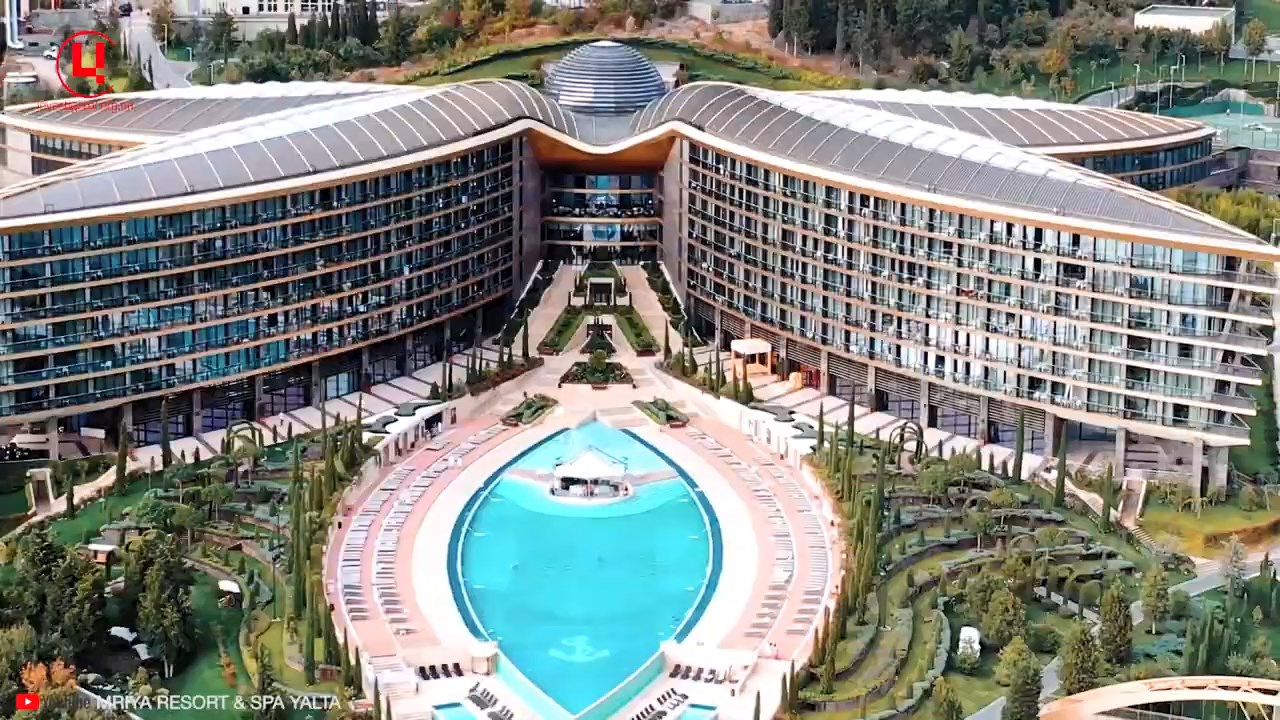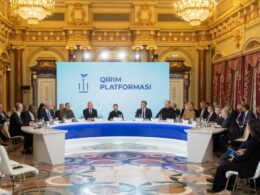This story is truly special because this hotel complex, popular among the Russian rich, officials, businessmen, and the company Garant-SV LLC that owns the hotel, as well as their ultimate owner, Sberbank of Russia, are under Western and Ukrainian sanctions.
In their investigative article on the matter, the Ukrainian media project Center for Journalistic Investigations (CJI) investigated how this sanctioned hotel takes part in a global, albeit commercial, tourist competition, and how the British organizer of the award violates the sanctions.
Every year, Russian media mark the Mriya Hotel’s award of the World Travel Awards with publications along the lines of “the world has recognized Russian Crimea,” calling it a breakthrough in “Crimean sanctions.”
During the award ceremonies, the hotel’s managers also take the opportunity to emphasize that the hotel is “located in Russia.”
In 2018, on WTA’s Facebook page, the organizers congratulated Mriya with another award, defining Crimea as Russian. Yet this year the profiles of Mriya and its Winepark don’t indicate the country of their location under the threat of more serious sanctions for Sberbank, their ultimate owner.
The Mriya Resort & SPA hotel and its parent company were put on a US sanctions list in November 2018 due to their connection with Sberbank of Russia, which was included in the lists of sectoral sanctions on 12 September 2014 by the US and the EU.
Mriya resort and its “wine park”
At the time of the beginning of the Russian occupation, the hotel’s construction wasn’t finished. After finishing the project, Russia started holding the so-called Yalta International Economic Forum in the hotel, the largest annual business event in occupied Crimea aiming at attracting foreign investors to the sanctioned territory.
On the margins of the event, Russia also organizes forums of the so-called International Association of Friends of Crimea, a propaganda project for making the world get accustomed to the idea that Crimea is Russian and achieving the lifting of Western sanctions.

In 2018, with Mriya Resort & Spa under the US sanctions, Russian President Vladimir Putin held here an extended meeting of the State Council, the highest advisory body of Russia. Opening the meeting, Putin praised the hotel and announced a new project, “Soon there will be vineyards and everything that belongs to them.”
Sberbank’s companies started to build the Winepark in the same 2018 on the 23-hectare land adjacent to the resort, which was illegally confiscated in favor of Mriya from the wine producer, the seized Ukrainian national association Massandra, immediately after the occupation of Crimea at the request of Sberbank Chairman Herman Gref.
In two years, Massandra’s vineyards were uprooted near Mriya and new ones were planted, with the area of the vineyards reduced from 13 to 7 hectares. Meanwhile, the Winepark itself received eight more hectares of land, expanding to a total of 30 hectares.
All three above-mentioned Russian companies are under Western sanctions, though this fact wasn’t an obstacle for Herman Gref and Sberbank’s Crimean projects on their way to receiving the World Travel Award’s prizes. What is more, Winepark received two WTA figurines even before corking its first bottle of wine made from its own grapes.
EU citizens at Russian service
The Winepark’s chief winemaker is German national Thomas Doll, who arrived in Crimea in 2011 as a guest wine consultant for the Alma Valley winery, owned by Russian national Andrei Kostin, chairman of Vnesheconombank.
Mr. Doll kept working for Russians after the occupation of Crimea, and in 2019 he even became a member of the jury at the “international wine competition,” organized by a Russian company illegally created on the basis of the captured Massandra, subject to EU and US sanctions.

Then Herman Gref employed Thomas Doll at his Winepark, and Mr. Doll isn’t the only European working there. In his interview with Ludi ROSTa, he spilled the beans that the Winepark project was designed by Italian architect Marco Casamonti, co-founder of the architectural firm Archea Associati, and another Italian, Alberto Antonini involved as the guest consultant-oenologist — an expert in the science of wine and of the arts and techniques for making wine.
- Read also: Ukraine prepares sanctions against Austrian firm over flagship opera house in occupied Crimea
Why the British “World Travel Awards” are not a competition and who owns this business
As the Center for Journalistic Investigations found, in order to become a member of the World Travel Award, you need only to send your application using an online form, then pay for your membership:
- £400 to be nominated for a country-wide award;
- £500 to get a nomination for a larger region, such as Europe.
Then the participants receive digital materials which include a vote link so that they should campaign to receive votes. No honorable jury is involved in the competition and no data is shown in the profiles of participants as to how many peoples or companies have voted for them.
Oleksandr Liev, Minister of Resorts and Tourism of the Autonomous Republic of Crimea in 2010-2014, shed light on the procedure for determining the winners of WTA’s awards,
“I remember how in 2013 the representatives of this ‘honorable’ award invited some of our facilities in the Crimea, including the Ministry of Resorts and Tourism, to take part in the competition on a commercial basis. It wasn’t free. As far as I can remember, it costs from 15,000 to 50,000 dollars to become a winner,” Oleksandr Liev said.
WTA uses the word awards rather than “competition” to describe its activities. Their award is a simple poll, while the words “competition” and “winner of the competition” emerge later in Russian propaganda media to give significance to the event.
To prove Liev’s words, the Center for Journalistic Investigations contacted several Ukrainian companies listed among WTA nominees but received no response from them.
World Travel and other awards
The World Travel Awards is a purely commercial event, a business project organized by World Media And Events Limited, registered in London in 2010, founded by Graham Edward Cooke and since 2018 headed by Justin Alex Cooke.

According to the UK Company Register, the Cookes are running or have founded about three dozen various companies with the word “awards” in their names.
However, according to The London Gazette, the High Court of Justice adjudged Graham Cooke bankrupt in 2014. For some reason, Mr. Cooke has been active in Russia and other post-Soviet countries in recent years.
The Center for Journalistic Investigations wrote a letter to WTA’s parent company, asking regarding the participation and awarding of the sanctioned hotel Mriya Resort & Spa and its Winepark and whether these two had transferred contributions for their participation and awards.
Another question was whether the organizers think that they violate the British policy of non-recognition of the attempt to illegally annex Crimea to Russia.
CJI says they received a reply letter signed by Graham Cooke thanking them for the information that the Mriya hotel has been under sanctions and promising to get in touch in the next five days, yet a week later there was no other reply.
According to international lawyer Bohdan Bernadskyi, nobody can deny any private company to put any hotel in the world on their lists, but the financial side of the issue matters: the sectoral sanctions by the EU and the US restrict any transactions with Crimea. Not just the Mriya hotel and its Winepark, but their parent company Garant SV and the owner of them all, Sberbank of Russia, are under sanctions, which means that any financial interactions with them are prohibited.
Further reading:
- How German companies violated sanctions to bring Dutch sea platform to luxury marina in Crimea
- Hall of Fame | Finland denies export licence for Danfoss engines due to Crimea sanctions
- Sanctions breach suspected as Siemens & Grundfos equipment spotted at water station in occupied Crimea
- Xiaomi reportedly temporarily blocked its smartphones in Russian-occupied Crimea and other sanctioned areas
- Sanctions on Russia are working, but they’re not enough
- Ukraine prepares sanctions against Austrian firm over flagship opera house in occupied Crimea
- NGOs to push for sanctions on 29 Crimea-based enterprises (2019)
- Scandal as Dutch companies help build bridge to occupied Crimea, violating sanctions
- US non-recognition policy regarding Crimea one year on
- Company that brought “little green men” to Crimea violated EU sanctions for four years: investigation








